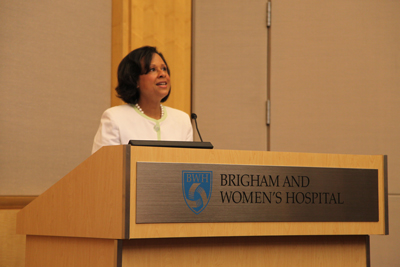Women's Health and the Affordable Care Act: A Discussion with the
Experts

Last month, Paula Johnson, MD, MPH, hosted a discussion in the Bornstein Amphitheater about the Affordable Care Act and how it affects women.
|
With the Supreme Court's decision to largely uphold President
Obama's Affordable Care Act (ACA) in June, questions about the health care
overhaul and its implementation abound, both inside and outside of the hospital
setting.
On July 9, Paula Johnson, MD, MPH, chief of the BWH Division of
Women's Health and executive director of the Connors Center for Women's Health
and Gender Biology, and the BWH Women's Health Policy
& Advocacy Program hosted a discussion in the Bornstein Amphitheater about
the Affordable Care Act and how it affects women.
"We are a truly fortunate state," said Johnson. "For six
years, Massachusetts
has had most of the benefits of national health care reform in place, but there
are still gaps in coverage, affordability and access." Accessing care can be a
particular challenge for women, Johnson said, because women on average have
higher annual health care expenses than men, report more challenges affording
care, and are disproportionally affected by chronic illness. "It is crucial for
women to understand what services they are entitled to under the Affordable
Care Act."
Also participating were women's health experts Christie Hager, JD,
MPH, regional director for Region I of the U.S. Department of Health and Human
Services, and Kate Bicego, consumer education and enrollment manager for Health
Care for All. Hager and Bicego discussed how health care reform can improve the
health and well-being of Massachusetts women and their families.
More than 70 people attended the event, including physicians,
nurses, researchers, outreach workers, community program directors and health
educators from BWH, Boston Children's Hospital, Boston Public Health Commission,
Asian Breast Cancer Project, event sponsor YWCA Boston, and other agencies and
organizations. The conference attracted a diverse group of attendees, with 45
percent self-identifying as minorities. The majority of attendees (58 percent)
were 34 years old or younger.
In
her presentation, Hager discussed the strong consumer protections available
under the ACA. "Prior to national reform, it had been legal in most states for
companies selling individual health policies to charge women more than men for
the same coverage," she noted.
The New York
Times
brought light to this issue in March 2010. "The rationale was that women used
the health care system more than men," wrote science reporter Denise Grady. "The
differences in premiums, from 4 percent to 48 percent, according to a 2008
analysis by the [National Women's] Law Center, can add up to hundreds of
dollars a year."
"Women's
health is a major determinant of the health of communities and future
generations," added Hager. "Under the Health Care Law, insurers will no longer
be able to deny coverage to women because they're pregnant, because they gave
birth by C-section, or because they are a breast cancer survivor or a victim of
domestic violence."
Hager
emphasized the importance of preventive services in sustaining and improving health
across a woman's lifespan. These services include gestational diabetes
screening, HPV testing, sexually-transmitted disease counseling, HIV screening
and counseling, a full range of contraceptive methods and counseling,
breastfeeding support and others. As of Aug. 1, all non-grandfathered plans,
which are health plans that were created or changed significantly after March
23, 2010, must cover women's health preventive services at no out-of-pocket
cost to women as part of the health care law.
"The
Affordable Care Act invests a significant amount of money in prevention
services in our communities for better public health outcomes," Hager said.
Kate
Bicego, of Health Care for All - a non-profit health advocacy organization dedicated to making adequate and affordable health care accessible to everyone in the state - discussed health
insurance options for women in Massachusetts. She broke down the eligibility
guidelines and numbers for such programs as MassHealth and Commonwealth Care.
She also provided real life examples of women and their insurance needs and
options.
"Almost
100 percent of women and their families are covered in the state of Massachusetts," Bicego said. "But there are still gaps
and barriers in coverage. Knowing your options is critical."
Edith Kenneally, of BWH Patient Financial Counseling Services,
shared information about the financial resources available to BWH employees
while managing their health care options.
The
event was made possible by support from the U.S. Department of Health and Human
Services Office on Women's Health Region 1 (New England) Office.
For
more information about the health care law, visit
healthcare.gov/law/resources/ma.html or www.brighamandwomens.org/womenspolicy.

From left: Therese Fitzgerald, director of the Women's Health Policy & Advocacy Program; Christie Hager, regional director for Region I of the U.S. Department of Health and Human Services; Paula Johnson, chief of the BWH Division of Women’s Health and executive director of the Connors Center for Women’s Health and Gender Biology; Kate Bicego, consumer education and enrollment manager for Health Care for All; Edith Kenneally, of BWH Patient Financial Counseling Services; and Nyjah Wyche-Alexis, of YWCA Boston.
|